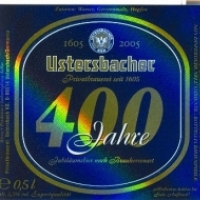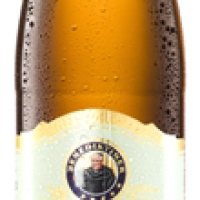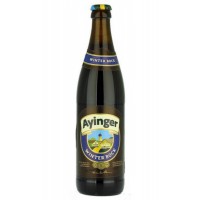Comprar Ustersbacher Jubiläumsbier 400 Jahre - Benediktiner Weissbier - Ayinger Winter Bock
La familia Schmidt, propietaria de la fábrica desde 1605, creó esta cerveza en el 2005 con motivo del 400 aniversario.
Es de color dorado transparente, muy burbujeante. Cabeza de espuma grande y compacta. Cerveza muy aromática, fresca, con sabor intenso. Acabado ligeramente amargo, muy agradable, proporcionado por el lúpulo Hallertau. Equilibrada y muy agradable de beber.
Benediktiner Weissbier
Heffe - Hell de caracter afrutado, turbia, sabor agradable ligeramente dulce. Equilibrada cerveza de trigo, sabor fuerte y frutal, turbidez natural y uniforme de la levadura, apariencia ámbar.
Esta cerveza de trigo que se fabrica según la receta original de los monjes de Ettal. Conocimiento, pasión y trabajo artesanal se fusionan para obtener máxima perfección en la calidad del producto.
En su elaboración se emplea exclusivamente la levadura original de Ettal, madurada con tranquilidad en las bodegas monacales, y que le proporciona a la cerveza Benediktiner Weissbier su carácter afrutado y picante que la hacen única.
De color entre amarillo dorado y ámbar, con reflejos anaranjados, espuma densa y de textura fina, típica de la cerveza de trigo, posee una menor concentración de ácido carbónico (6 g/l) que otras weissbier.
Ayinger Winter Bock
The recipe for this beer goes right back to monastery traditions. The complex triple mash process using four types of malt gives the dark “doppelbock” its characteristic malty dominance and its close to black color. The storage time of 16 weeks produces a pronounced, well-rounded taste. Despite a high original wort content, the sweetness that is frequently present with doppelbocks can scarcely be detected. The first taste is of mild fullness with an accompanying coffee tone, which becomes more dominant with the aftertaste. Between November and January you can allow yourself to be completely won over by the excellent quality of the Winter Bock.
- Voll-Damm - Mercadona Doble Malta
- Salvaje Grilla - Salvaje Hibiscus - Salvaje Aguilutxo
- Dubuisson Cuvée des Trolls - Dubuisson Cuvée des Trolls Triple - Bush de Noël
- Carolus Cuvee Van De Keizer Rood - Lucifer
- Sevebrau Gusti - Exulans Negu - Grenyut IPA Medusa
- Emelisse D.I.P.A. - Faxilda Atlantic IPA - Stigbergets Amazing Haze
- Otro Mundo Nut Brown Ale - Otro Mundo Golden Ale - UBC Black IPA
- Schneider Weisse Tap 1 Helle Weisse - Beck’s Green Lemon - 3 Horses Malt
- Amager The Sinner Series Pride - The Chocolate Manifesto - Triple Chocolate Milk Stout - To Øl Mr. Brown 2018 Edition
- Stillwater Rauchstar - Flying Dog Snake Dog - Flying Dog Doggie Style Pale Ale
- To Øl Thirsty Frontier - To Øl #YOLOmælk
- Estrella de Levante Clásica - Amstel
- Falken Brewing Double Dragon - Falken Brewing Runnin Out - Falken Breing / Sesma Bubble Gose
- Heineken - Pilsen Callao - Cristal Perú
- Corona Extra - Tecate - Cerveza Sol
- Blue Serpent Dark Ale - Blue Serpent Original - Blue Serpent Dark Ale Gran Reserva
- Port Brewing Hop-15 Ale - Port Brewing S.P.A. Summer Pale Ale - Amager / Port Brewing Wookiee IPA
- Heineken - Stella Artois - Modelo Especial
- Heineken - Tecate Light - Budweiser
- Mad Brewing / Guineu Toma Shock - Caleya Mansalva - KESSE India Pale Ale
- Mahou Cinco Estrellas - San Miguel Especial
- Jakobsland Yé-Yé-Yeah! - Jakobsland Starz In Your Eyes - Jakobsland Places No One Knows
- Estrella Galicia 1906 Reserva Especial - La Milnueve - San Miguel 1516 - Mahou Maestra
- Medalla Light - Inveb Brahma
- Imperial Lager - Bohemia
- Meantime London Pale Ale - Adnams Jack Brand Innovation IPA - The Kernel India Pale Ale Citra Zeus
- Iberian Espècies - Mitika Galtzagorri - Odiel Negra de Trigo
- Poppels American Pale Ale - Poppels Session IPA - Poppels DIPA
- Desperados Original - Mercadona Cerveza Reserva
- El Alcázar - Ladrón de Manzanas - Amstel Radler
- Minerva Colonial - Etxeandia Katalina - Caperuza Estilo Kolsch
- Amstel - Anheuser-Busch Michelob ULTRA
- Estrella Damm - Birra Moretti Alla Toscana - Peroni Nastro Azzurro
- Alhambra Reserva 1925 - Grimbergen Double Ambrée - Pirineos Bier Blond Ale
- Ambar Manzana - Clausthaler Radler Alkoholfrei / Radler Lemon - Gerstel Alcoholfrei
- Birra Moretti Alla Toscana - Peroni Nastro Azzurro
- San Miguel Especial - Amstel Clásica
- Anchor Old Foghorn Barley Wine Style Ale - Nøgne Ø # 100
- Ales Agullons Barrica 2010 - - La Pirata Vallenato Coffee Porter - Ctretze Gisca
- San Miguel Especial - Alhambra Tradicional - Cruzcampo Gran Reserva
- Furstenberg Hefeweizen - Schönramer Imperial Stout - Aecht Schlenkerla Rauchbier Weizen
- Estrella Galicia Especial - Estrella Damm - Ambar Especial
- Morlaco Labrit - La Mariseca
- Chimay Première (Red) - Chimay Grande Réserve (Blue)
- Sinagoga Irish Red Ale - Mulatt Irish Red - Santocristo Fillos
- Dos Equis (XX) Lager Especial - Tecate - Heineken 0.0
- Zibeles Triple IPA - La Sagra Suxinsu - Guineu Hop Magma
- Calvin’s Rubia - Virtus Pilsen - Flensburger Pilsener
- Antares Honey Beer - Me Echó la Burra Roja - Darwin Genghis
- Stella Artois - Inveb Brahma - Imperial IPA
- Brouwerij de Molen / Tired Hands Lost & Found - Ratpenat Bandera Negra Black IPA - Cornèlia / HZT1L Ghetto Blackster
- Salitos Tequila - Fellow-Sip IPA - Mönchshof Schwarzbier
- San Miguel 0,0 Manzana - Vacceum Origen - Espiga Garage IPA
- Baird Dark Sky - Ceuta Star La Sembrá - Troubadour Imperial Stout
- Bou Bou - Bior Tostada - La Pirata ¡Ay, Carmela!
- Lindemans Faro - Lindemans Pêche / Pêcheresse - Lindemans Cassis
- Modelo Ambar - Naipe Trébol
- Cantillon Grand Cru Bruocsella Lambic Bio - Prearis Christmas (X-Mas)
- Pilsner Urquell - Sékar Doble Malta
- Free Damm - Free Damm Tostada - Mahou 0,0 Tostada
















